And then there were all the people who inspired and challenged him athletically, like track coaches Ed Kilkelly, Arthur O’Connor, and Jack Brown—to say nothing of Fordham track’s most famous alumnus, two-time Olympic gold medalist Tom Courtney, FCRH ’55.
Courtney enjoyed “a certain degree of royalty” at Fordham, said Ostling, who met him during one of his many visits to campus.
These and other recollections come up as Ostling discusses his recent major gift to Fordham’s track and field and cross country programs in honor of coaches O’Connor and Brown.
By giving, he seeks to help today’s student-athletes have the best possible experience—like he did.
“I thought it was time to try to help make a difference” for them, Ostling said.
A Lesson in Giving
Ostling, who retired as chief operating officer at EY, formerly Ernst & Young, earned his bachelor’s degree from Fordham’s former Undergraduate School of Education before enrolling in Fordham Law School. A longtime generous donor to the school, he is quick to praise all the people who made a mark on his personal and professional growth—from coaches to classmates to colleagues in his legal career.
Those who inspired his philanthropy include a past dean of the law school, Joseph M. McLaughlin, FCRH ’54, LAW ’59, who made a lasting impression with a quick act of generosity. It happened when Ostling was being interviewed by McLaughlin after first arriving at the law school as a recently commissioned military officer, wearing his U.S. Marine Corps uniform.
Expressing concern about Ostling’s ability to pay for a more diverse wardrobe, McLaughlin turned around and wrote him a generous check, only asking that Ostling pay it back when he could.
“I can’t tell you what that meant to me,” Ostling said. “I guess he knew a lot about my financial background and that sort of thing from my application. That moment of him without any need to, or request, turning around and doing that just made a huge [difference].”
He noted that his gift to Fordham track followed Courtney’s death last fall, so in a way it helps continue Courtney’s unstinting support for the program.
“My aspiration is that the young men and women at Fordham who participate in track and cross country have the chance to feel the same experience I felt,” Ostling said. “I had a great academic experience, a great social experience, a great athletic experience at Fordham.”
Athletics fundraising is one of the pillars of Fordham’s $350 million fundraising campaign, Cura Personalis | For Every Fordham Student. Learn more and make a gift.
]]>Today, they’re helping Fordham build its own.
When they learned about the waterfront center that Fordham is planning, “it was something that we felt really strongly that we’d like to be able to help create,” Laura Ekholm said.
They’re doing just that with a major gift toward the project, for reasons that have a lot to do with their children’s experience at Fordham.
Support for Sailing and Other Aquatic Sports
The waterfront center will be built on Eastchester Bay in the Bronx, four miles east of the Rose Hill campus, to serve the varsity women’s rowing team as well as men’s crew, co-ed sailing, and women’s sailing. The first phase, construction of docks, is expected to be completed in time for the fall 2024 season.
Fordham donors and supporters have been moving the project along for years, led by Fordham Trustee Fellow Dennis Ruppel, FCRH ’68, and his wife, Patricia Ann Ruppel, who are making another major gift to the project this year. In October, Fordham Trustee Kim Bepler hosted and underwrote a fundraising dinner for the project at the New York Yacht Club in Manhattan.
The event raised $1.3 million for the project—with $1 million of that coming from the Ekholms.
‘Something of Great Value’
The Ekholms raised their family on Minnesota’s Lake Minnetonka, and their children grew up sailing on it, so when two of them—Anders, FCRH ’17, and Annika, FCRH ’20—went to Fordham, it was no surprise that they signed up for sailing.
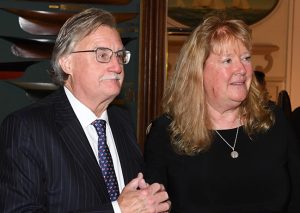
They were impressed at the strength of the classroom education their children received, as well as the tight-knit sense of community in the sailing program and its rigors that hone time management and other life skills.
Today, Anders Ekholm is a team lead with TransPerfect, a translation and language services company in New York, and Annika Ekholm is involved with the sailing program full time. In addition to volunteering as a coach, she works for the Fordham Sailing Association, helping to set up a community sailing program in conjunction with the Villa Maria Academy, a Catholic elementary school next door to the waterfront center’s site.
She’s excited to see how the center could support other programs for area youth as well. “Sailing has given me and so many other people in the Fordham sailing sphere so much,” she said, “and anything that we can do to spread that, to give that to the community, will be a great, great thing for all involved.”
Being involved with the sailing program has been “a ton of fun,” Laura Ekholm said. “It’s just a fabulous community.”
She and Paul are investing in the waterfront center not only because of its immediate benefits but also to advance the University generally. “Giving money away is something to do when you find something of great value,” Paul Ekholm said. “For me and Laura, the great value of Fordham was the education they got, and we feel like we should support Fordham beyond sending our kids there.”
Gifts in support of the Fordham waterfront center advance the University’s $350 million fundraising campaign, Cura Personalis | For Every Fordham Student. Learn more about the campaign and make a gift.
]]>“I think it’s very important that Fordham has a window on the water,” said Dennis Ruppel, FCRH ’68, a Fordham trustee fellow who is spearheading efforts to construct a waterfront center on Eastchester Bay in the Bronx, to the east of the Rose Hill campus.
He and his wife, Patricia Ann Ruppel, are leaders among alumni donors who have been moving the project along for years. In addition to covering various costs of the project, they purchased the one-and-a-half-acre plot where the center will be built and donated it to the University.

Now, in a new fundraising push, they’re offering a $1.25 million challenge gift—on top of an earlier $1.25 million gift—to encourage other donations in support of the waterfront center, a project with benefits that will extend beyond Fordham.
In addition to providing a home for Fordham’s waterborne sports, Ruppel said, it will provide year-round opportunities such as summer sailing programs for New York City youth and, possibly, educational programs that shed light on marine biology while fostering a greater appreciation of the natural world generally.
“This waterfront [center]is really about the University having a permanent place to interface with the water,” he said.
Kim Bepler, a Fordham trustee and 2022 recipient of an honorary doctorate of humane letters from the University, is also hosting and underwriting a fundraising dinner for the project on October 16 at the New York Yacht Club in Manhattan, where both she and the Ruppels are members.
Coming in Fall 2024
Fundraising for the waterfront center advances Cura Personalis | For Every Fordham Student, the University’s $350 million campaign to enhance the entire student experience, including athletics. The new center will include fixed and floating docks, boat storage for the sailing and rowing programs, and, later on, a two-story building offering locker rooms as well as educational and event spaces and wide windows for viewing Eastchester Bay.
Architectural work and construction can begin as soon as a final New York City permit is issued and sufficient funding is secured, said Michael Mullarney, FCRH ’68, Ruppel’s former roommate at Fordham and another donor to the project. The docks are expected to be completed in time for the fall 2024 sailing season; temporary facilities will be put in place for the sailing and crew teams while the waterfront center’s main building is constructed, he said.
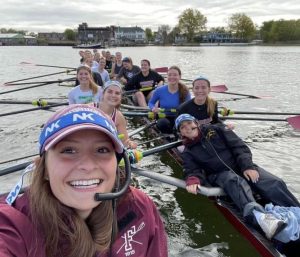
The facility aims to serve the varsity women’s rowing team as well as men’s crew, co-ed sailing, and women’s sailing, all of them club sports. The waterfront center will free them from having to rent space at various locations on the Harlem River and Eastchester Bay and help student-athletes take to the water more promptly and easily at practice time, Mullarney said.
“This gift from the Ruppels has the opportunity to be truly transformative,” said Fordham’s athletic director, Ed Kull. “Not only will this endeavor enhance the day-to-day lives of Fordham’s rowers and sailors, but we hope the Ruppels’ generosity sparks further giving to support rowing and sailing and other sports as well.”
“This project is a testament to our shared priorities and purpose at Fordham, beginning with the highest levels of University administration,” he said. “I look forward to seeing how the Ruppels’ continued support benefits our student-athletes for years to come.”
In the new facility, Ruppel and other supporters see an opportunity to elevate the sailing and crew programs—making it possible to host regattas and help the sailing program win a national championship.
The waterfront center will be constructed on a plot now occupied by a long-shuttered Westchester Country Club building that was damaged by Hurricane Sandy in 2012. Ruppel and Mullarney, commodore and vice commodore of the Fordham Sailing Association, respectively, found the property seven years ago while searching the area for a suitable site.

Recalling the national prominence of Fordham basketball in the 1960s and ’70s, Mullarney spoke about the potential for sailing and crew to generate excitement and draw Fordham students to the site on the Eastchester Bay waterfront, where they would view the Fordham teams competing in high-stakes contests out on the water.
He described the project as an investment in hardworking students who study during the long drive to regattas, study during breaks in competitions, and give their all when out on the water, even during races and practices that take place in punishing wintertime conditions.
“The sport itself is just so amazing—watching these students [with their]total positive attitude,” he said.
Ruppel noted that he and his wife have hosted Fordham’s sailing team members at their Florida home when the team visits the state for competitions. It’s a sport that tends to foster teamwork, attention to detail, and discipline—as well as a longer-term commitment to advancing Fordham sailing, he said.
“We’ve just had some wonderful, wonderful sailors in our program, and they are very supportive and very engaged in wanting to carry that forward,” he said. “So that’s great to see.”
To inquire about giving to the waterfront center project, contact Kara Field, director of athletic development and assistant athletic director, at 973-223-2157 or [email protected]. Learn more about Cura Personalis | For Every Fordham Student, a campaign to reinvest in every aspect of the Fordham student experience, including athletics programs such as sailing and rowing.
]]>Moglia, an award-winning football coach and transformational business executive, is just the fourth alumnus to be honored with the Fordham Founder’s Award as well as induction into Fordham’s Hall of Honor and its Athletics Hall of Fame. He is also a member of Fordham Prep’s Hall of Honor and Football Hall of Fame, and received an honorary doctorate from the University in 2009.

“Joe embodies the Fordham way,” said Tania Tetlow, Fordham’s president. “From his time as a student at the Prep, his undergrad days at Fordham University, and throughout his business and coaching career, Joe has been closely connected to Fordham and all this institution stands for. Joe has made us proud by clearly living the Fordham principles and mission. The stadium upgrades wouldn’t be possible without Joe’s continued generosity to the University. We are honored to name this stadium after him.”
Fordham will begin renovations to Moglia Stadium at Jack Coffey Field in order to make the stadium a top-tier venue for games and University events. The improved facility will feature a state-of-the-art video board, seating and press box renovations, upgraded lighting, and other improvements that help raise the profile of the University, boost recruitment, and enhance the game-day experience.
A Life of Leadership on the Field and in the Boardroom
A son of immigrants who grew up in the Dyckman Street area at the northern end of Manhattan, Moglia played football and baseball for four years at Fordham Prep before attending Fordham College at Rose Hill.
“I loved and always appreciated the education I got from Fordham,” Moglia said, citing its Jesuit approach as well as the many strong friendships he formed via the University and the Prep. “I’m proud to have been able to have a positive impact on the lives of others, and that all traces back to Fordham. A big part of whatever success I’ve achieved across two career paths is because of the education that I received there.”
When Joe began at Fordham, he was already a husband and father, and completely responsible for his education. He funded those expenses by driving a yellow taxi cab and a truck for the United States Postal Service. He also worked in his father’s fruit store, all the while carrying a full course load at Rose Hill. Due to his responsibilities, Moglia wasn’t able to be part of the Rams football team, but it was at Fordham that he began his football coaching career as an assistant at Fordham Prep.
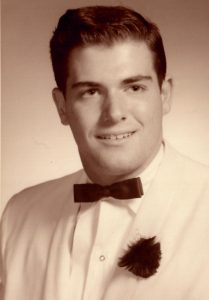
His coaching experience and the education he received at both the Prep and the University were formative for him, leading him to formulate, at age 21, his leadership philosophy – BAM – which defines the principles of a leader: standing on one’s own two feet, taking responsibility for oneself, treating others with dignity and respect, and accepting the consequences of one’s actions.
This philosophy, he said, “dealt with everything: The idea of spiritual soundness, really knowing who you are so you can make better decisions under stress; courage, the guts to do what you really believe is right; love, the recognition that leadership is not about you, it’s about the well-being of others; and the ability to adapt and adjust when things are not going particularly well.”
This philosophy guided him in his one-of-a-kind career as a winning head college football coach and successful Wall Street executive, he said. He coached high school and college football after graduating from Fordham and went to work on Wall Street in 1984, at Merrill Lynch, and eventually became CEO and board chairman of TD Ameritrade.
When he stepped down as CEO from TD Ameritrade in 2008, shareholders had enjoyed a 500% return. Joe stayed on as chairman of the TD Ameritrade board through 2020 when the firm was acquired by Charles Schwab. When the deal was announced, the combined company was worth $100 billion and had client assets of $7 trillion; when Moglia first arrived, these numbers were $700 million and $24 billion.
After stepping down as CEO of TD Ameritrade, Moglia decided to go back to football as a Division I head coach. In 2012, Moglia was named head football coach at Coastal Carolina University. In his last 11 years as a college football coach, Joe was part of eight championship teams and received the Eddie Robinson National Coach of the Year Award and the Lombardi Award. He was also inducted into 10 Halls of Fame, including the Vince Lombardi Hall of Fame, named for the 1937 Fordham alumnus. Moglia now serves as chair of athletics and is an advisor to Coastal Carolina University President Michael T. Benson.
Moglia Stadium
Moglia Stadium is part of a complex at the Bronx campus that includes Jack Coffey Field—the playing field for football and soccer—as well as Houlihan Park, the University’s baseball venue. The renovations will be a “game changer” because of the importance of the stadium as “a central theater of school spirit and school pride—internally on campus, externally in New York City and the tri-state area, and also for our alumni base,” said Fordham’s director of athletics, Ed Kull. The benefits of the stadium upgrades will extend not only to football and other sports but also to Fordham Prep, which uses University facilities as part of athletics collaborations, Kull said.
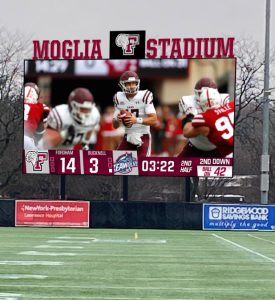
The stadium improvements also include new connections with a video control room in the Lombardi Center that, when completed, will be used to livestream all home athletics events and provide a training ground for WFUV student announcers and other students interested in broadcasting.
A new digital scoreboard and VIP viewing box are planned, along with other seating improvements.
The project will build on other recent enhancements like new offices for the football program, also supported by University benefactors. The stadium upgrades will help Fordham achieve parity with the stadiums at competitor schools and boost recruitment, “the lifeblood of the program,” aiding the program in its goal of once again reaching the NCAA Football Championship Subdivision (FCS) playoffs every year, said Joe Conlin, head football coach.
Kull said the football program tries—successfully—to recruit student-athletes who can be academic achievers at Fordham. Conlin also noted the team’s many community service efforts, such as visiting children in elementary and middle schools and working with Team IMPACT, a nonprofit that supports children living with serious illness or disability.
The revamped stadium will reflect “the class of institution that Fordham is,” Conlin said. “We should have a great game-day experience. We should have a great stadium. It’s a fantastic school and we have a fantastic fan base, and we have the best tailgate in FCS football, so the stadium should match that.”
]]>
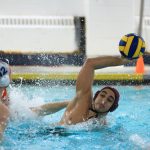
 About 20 years ago, Fordham’s water polo program was in trouble. The pool in the Lombardi Center at Rose Hill needed upgrades and improvements before the players could use it—and those upgrades would be expensive.
About 20 years ago, Fordham’s water polo program was in trouble. The pool in the Lombardi Center at Rose Hill needed upgrades and improvements before the players could use it—and those upgrades would be expensive.
Without them, the “the program was at risk,” said Richard Sweeney Jr., GABELLI ’88, an alumnus of the water polo program.
Sweeney and another water polo alumnus—Nicholas “Kola” Romano, GABELLI ’89, a Fordham trustee fellow—appealed to alumni, seeking funds for the improvements, and received a strong response, to the tune of more than $75,000. “We realized we had a really strong alumni base, and there was a lot of interest” in supporting the program, Sweeney said.
NCAA Championship Contenders
Other fundraising campaigns followed. The program built an endowment as alumni support grew and progressed. More funding also came from the University, friends of the program, and student-athletes’ parents. And the program was strengthened and revitalized under the leadership of head coaches Bill Harris and Brian Bacharach, who has served in the role since 2020.
All of this brought results, helping Fordham water polo boost its national rankings and advance to the NCAA championship twice in recent years. The program has raised its profile in faraway markets—in California and Europe in particular. Now, Romano and Sweeney are co-leading a new fundraising push for Fordham water polo—a three-year, $300,000 campaign to help the program reach new heights in the NCAA and bring new visibility to the University, both across the U.S. and abroad.
Competing for the World’s Top Players
This effort dovetails with the larger University campaign, Cura Personalis | For Every Fordham Student, which seeks to raise $350 million to enhance the entire student experience, including athletics.
Romano and Sweeney got the idea for the water polo campaign last fall. The team had won the Mid-Atlantic Water Polo Conference championship for the second year running. It had achieved top-15 rankings in Collegiate Water Polo Association polls that are typically dominated by universities on the West Coast, where the sport is more popular.
And the program has been attracting more interest from prospective students abroad, especially Europe, where water polo is more of a fixture than in the United States. Today, half the team’s student-athletes come from other countries. “We’re a viable alternative now for the top players in the world,” Romano said.
The new fundraising campaign is off to a strong start, boosted by a Fordham Giving Day campaign that netted more than $115,000, exceeding its goal. Campaign funds will create new possibilities for recruitment, scholarships, competitions on the West Coast or overseas, and other things that build the program and raise its profile. The campaign is paired with efforts to engage alumni in mentoring student-athletes and providing them with networking opportunities.
Romano and Sweeney are optimistic, given past successes.
“If you invest in [the program], if you get the right people in charge, and there’s a strategic vision for the future, a lot of greatness can come from that,” Romano said. “We took a team that was almost at a club level 20 years ago and is now a top 15 program in the country.”
To ask about contributing to Fordham Water Polo or another athletics program, contact Kara Field, director of athletic development and assistant athletic director, at 973-223-2157 or [email protected].
]]>“The restoration of football changed the entire dynamic of the University,” energizing students and prompting many alumni to reengage with Fordham, said Costantino, a 1967 graduate of the Gabelli School of Business and 1970 graduate of Fordham Law School.
These days, he and his wife, Barbara Costantino, are continuing to invest in this school spirit by giving to Fordham athletics. They are among the University’s most generous benefactors, as signified by the naming of the Costantino Room at the law school and the Fordham Founder’s Award presented to them in 2018.
They’ve supported everything from the law school’s Neuroscience and Law Center to its Feerick Center for Social Justice and WFUV, Fordham’s public media station, as well as various undergraduate scholarship funds.
But athletics are especially resonant for them. They’ve given to a wide variety of sports programs—softball, soccer, sailing, others—and co-led the fundraising for a new suite of football offices at the Rose Hill campus.
Basketball at the Forefront
And they’ve invested in Fordham basketball, one of the programs that is firing up Fordham the most these days—in particular, the men’s program, with its performance that is prompting comparisons with the program’s glory days under head coach Richard “Digger” Phelps in 1971.
The Costantinos traveled with the women’s and men’s teams in February as the teams were amassing their respective regular season records of 18-11 and 24-7. “We have really wonderful student-athletes at Fordham. We’re very lucky,” John Costantino said, noting their courteous behavior as well as the strong academic records they maintain, despite packed schedules.
Athletics is a pillar of the University’s $350 million fundraising campaign, Cura Personalis | For Every Fordham Student, because of its potential to engage students and alumni and raise the University’s national profile.
The men’s team seems to show this potential, John Costantino said. “The students are responding, there’s no question,” he said, citing the sellout crowds for recent games. He also lauded Tania Tetlow, president of Fordham University, for her commitment to athletics as an important part of the University experience. “I think she’s terrific—she goes to the games, she cares, she’s a believer in athletics,” he said.
For the Costantinos, supporting athletics has provided a lifelong source of camaraderie and community. “We made so many lasting friendships,” said John, a former managing partner of NGN Capital and a Fordham trustee emeritus. “It’s been, for us, a real joy to be involved.”
What are the roots of your longstanding giving to Fordham athletics?
Barbara and I both had athletics in our families. I always loved sports—I was playing since early childhood in Brooklyn. I played football and intramural basketball and played baseball until I was almost 22. My father brought me to my first baseball game, a Brooklyn Dodgers game. When I was at Fordham, the restoration of football really brought out the school spirit because of the great history of the Seven Blocks of Granite [the famous Fordham football line that included Vince Lombardi, FCRH ’37]. I think Barbara and I went to every game before I graduated from Gabelli.
Athletics are a very important part of the university experience—for players, the other students, and also for alumni. Through athletics, we’ve met so many good people, and knowing a lot of these people helped my career. When you know people and they trust you and they’ve enjoyed being with you, they will reach out and help when they can. And that extends to giving—we have friends that are very involved in the sailing program, for instance, so we support that, and they’ve supported us on football and baseball and so forth, like a quid pro quo, as we say in the law.
What do you think is the most important ingredient in a sports team’s success?
I think principally it’s leadership. A coach who’s successful can be tough sometimes, and that results in raising the quality of play. But in the end, you have to show you care about those players. It’s a very fine line. The other thing is the sense of team. It isn’t a one-man show or one-woman show, it’s a team, and teams win games. One thing you learn playing athletics is how to work with diverse people, how to deal with a lot of things, because you don’t necessarily like everybody in that room, but you try. And when it does work, it’s quite magical, I think.
What’s the best piece of advice you ever received?
Barbara: Don’t forget where you come from. Keep your friends, try to be good to people, and maintain your ties.
John: I actually had two. My father told me, “Treat people like you want to be treated.”
Do you have any advice for today’s graduates as they launch their careers?
I think the key is to work hard, just as hard as you “work” while you’re playing. And do the right thing, even though it’s painful, because in the end it’ll serve you much better.
To ask about contributing to Fordham athletics, contact Kara Field, director of athletic development and assistant athletic director, at 973-223-2157 or [email protected].
]]>After John E. Toffolon Jr., GABELLI ’73, ’77, died on April 26 following a battle with cancer, his family asked for memorial donations to be sent to Memorial Sloan Kettering Cancer Center and to Fordham—specifically, to its New Era Fund supporting the men’s and women’s basketball programs in their drive for national prominence.
About $400,000 in memorial donations has come in to date, a sign of the strong interest prompted by Toffolon’s leadership in advancing the basketball programs, said Fordham’s athletic director, Ed Kull.
“This strong community of donors is a testament to John’s passion for the University,” said Kull, adding that Toffolon’s memory will be honored at a home basketball game this season. “I want to thank all of those who have given to Fordham basketball in memory of John Toffolon. Thanks to our community’s strong support for the New Era Fund, his passion for the program will continue on.”
That passion took root in his student days, when Fordham basketball became a national powerhouse that sold out Madison Square Garden and fueled fierce pride in the University. In 2020, as a trustee fellow, Toffolon co-founded the New Era Fund as part of the University’s current $350 million fundraising campaign, Cura Personalis | For Every Fordham Student, which seeks to enhance the entire Fordham experience. He brought many other supporters along through his example.
In fact, he had been setting an example of giving back and helping others for most of his life—and not just in the arena of basketball.
Forged at Fordham
During his student years, Toffolon was active in many areas of University life, including United Student Government, and seemed to be able to move in every circle of students, as described by two of his classmates, David and Don Almeida, twin brothers and 1973 graduates of the Gabelli School of Business. “He was very much a Fordham guy,” said Don Almeida, a Fordham trustee fellow, “and when he graduated, he remained that for the rest of his life.”
After graduating, Toffolon launched his investment banking career in the management training program of the Federal Reserve Bank of New York and came back to Fordham a few years later to earn an M.B.A. That’s when he met his wife, Joan C. Toffolon, GABELLI ’77, a fellow student in the program. He went on to hold leadership roles at First Boston Corporation, Nomura Securities international, and the Cowen Group, among other firms.
He was board chairman at Cowen during its 2009 merger with Ramius LLC, and showed genuine concern for everyone in the merged company, said Jeffrey Solomon, who was a managing member and founder of Ramius.
“John was always well intended, thoughtful, and wanted to make sure that he was making a positive impact in the lives of others,” said Solomon, now chairman and CEO of Cowen, a New York-based banking and financial services firm. Toffolon “wanted to make sure that, through his board stewardship, we were doing the best things we could for everybody at Cowen,” he said.
Giving from the Heart
That care and concern extended to his philanthropy. “John was the real deal,” said David Almeida, a board member with the Making Headway Foundation, which serves families of children diagnosed with brain or spinal cord tumors. Toffolon was a longtime supporter, and “would actually call me up every year to make sure I got the check,” a level of personal attention that meant a lot to him, Almeida said.
Toffolon gave to many organizations supporting health, education, and youth development, and played a leadership role in Fordham’s fundraising efforts. He often gave in partnership with his wife, Joan; in 1995, they created the Joan and John E. Toffolon Jr. Presidential Endowed Scholarship Fund for women attending the Gabelli School of Business.
The first recipient of the scholarship, Cindy Vojtech, Ph.D., a 2000 graduate of the Gabelli School, periodically met Toffolon for lunch. “In any conversation, it was just very clear that he was very enthusiastic about this school and about giving back and trying to … help shift the industry” toward having more women represented in its ranks, said Vojtech, a principal economist at the Federal Reserve Board and a member of the Fordham University President’s Council.
The Toffolon scholarship made it possible for her to come to Fordham and pursue her career dreams in finance and economics, she said. Today, she is paying it forward by creating a scholarship of her own, so that future students can enjoy the Fordham community and support that she did. “It’s just such an amazing gift,” she said.
Another recipient, Samantha Barrett, GABELLI ’21, met John Toffolon on a few occasions, joining him for a Fordham basketball game and dinner at Roberto’s on Arthur Avenue in the Bronx in 2018. “He was just a truly wonderful man, with the kindest heart, and I am a better person for having known him,” she said.
It was humbling and amazing, she said, to learn that the Toffolons’ scholarship would be covering the full cost of her Fordham education. “In that moment, I knew that I needed to have a college career where I did my best—for myself, for John and Joan, for my family, for those around me,” said Barrett, now an analyst at Jefferies Credit Partners in New York City. “I kept John and Joan in mind in every decision I made at Fordham,” wanting to make them proud, she said.
Before the launch of the New Era Fund, the Toffolons made many gifts to support athletics. At the Lombardi Center on the Rose Hill campus, they funded the installation of a wood floor on a practice court—now named in their honor—that is sometimes used by the basketball teams.
That gift seemed to come out of the blue, said Frank McLaughlin, FCRH ’69, athletic director emeritus at Fordham and special advisor to the director of intercollegiate athletics and recreational sports.
“He would do a lot of things unannounced like that, to help people,” McLaughlin said.
Days of Glory
McLaughlin knew Toffolon for about six decades, since Toffolon was a student and he, McLaughlin, was a young assistant basketball coach at Fordham for one season under head coach Richard “Digger” Phelps.
“In 1970–1971, it was a magical year where we were a national power, and he saw what that meant to everybody,” McLaughlin said. “There was a tremendous pride in the institution.”
The Rams went 26-3 that year, playing twice before sold-out crowds at Madison Square Garden—beating Notre Dame the first time and falling to Marquette a week later. Fordham advanced to the “Sweet 16” in the NCAA tournament and finished the year ranked ninth in the country.
“Everybody was coming to see us, and Madison Square Garden was full,” Don Almeida said. “I was scared the place was going to fall down, it was shaking so much [with]everybody standing and rocking.”
The school spirit had a unifying effect, he said. “You had ROTC marching in Edwards Parade and you had anti-Vietnam War demonstrations going on all over campus, and at night, everybody was at the basketball game,” he said.
“For the four years that [John and I were] at Fordham, we had very, very respectable basketball teams,” which set a benchmark for the team’s future efforts, Almeida said. “No matter what happened thereafter, we knew what we could do, because we had done it.”
Launching a New Era
Almeida and Toffolon were part of a group led by Fordham trustee Darlene Jordan, FCRH ’89, that started the New Era Fund to boost the basketball teams as a unifying source of Fordham pride and enhance the University’s national profile.
The fund pays for the recruitment of coaching talent and various supports to help student-athletes do their best in class and on the court. With its help, the men’s team improved to a 16-16 record last season under then-head coach Kyle Neptune, and it’s seeking further progress this year under Keith Urgo, who became head coach in April.
Toffolon “was very passionate about seeing the New Era Fund get off the ground” and cared deeply about helping the student-athletes, said Frank Aiello, GABELLI ’76, a supporter of the fund and member of Fordham’s Athletics Hall of Fame committee.
He kept coming to Fordham basketball games while undergoing cancer treatments. “He was all in,” Don Almeida said. Toffolon knew and interacted with all the players, and the entire men’s and women’s teams came to his wake, along with members of the coaching staff. “There wasn’t a dry eye in the place,” he said.
Following a Mass of Christian Burial on May 5 at St. Joseph’s Church in Bronxville, New York, John Toffolon was laid to rest at Gate of Heaven Cemetery. Survivors include his wife, Joan, their daughters, Ashley and Allison, and his sister, Penley Kidd (Douglas).
“There isn’t a day goes by when I am not saddened that he is no longer here to support us. But he’s there in spirit, I’ll tell you that much,” McLaughlin said. “He was an inspiration.”
To ask about contributing to the New Era Fund, contact Kara Field, director of athletic development and assistant athletic director, at 973-223-2157 or [email protected].
Learn more about Cura Personalis | For Every Fordham Student and make a gift.
]]>The Ramses Challenge was announced Aug. 31 by Fordham athletics, just in time for the fall season. Donors are asked to pledge an amount they’ll give for every touchdown or defensive sack by the football team; every goal scored by the water polo or men’s or women’s soccer teams; each set won by the volleyball team; or each top-20% finisher in the cross country program. All gifts are tax deductible and go directly to the donor’s sport of choice.
So far, all of the fall teams have received donations through the challenge, which will eventually be expanded to all varsity sports and, likely, to Fordham’s club sports as well. “We want our supporters to feel like they are a part of the team, in that we want them to feel just as excited as our student-athletes about every touchdown or goal scored,” said Ed Kull, Fordham athletics director.
The donated funds will advance Fordham’s $350 million fundraising campaign, Cura Personalis | For Every Fordham Student, by supporting recruitment, team travel, gear and equipment, tutors and academic support, and other things important to teams’ success and players’ growth and development.
Stronger Bonds
The programs’ coaches hailed the initiative for its potential to strengthen bonds that sustain their programs.
“This is such a great opportunity to reconnect with our alumni and support Fordham volleyball,” said Ian Choi, the program’s head coach. “The landscape of college athletics is changing so rapidly, but our program has never wavered in our dedication and regard for the student-athlete.”
Joe Conlin, head football coach, expressed gratitude for the challenge, calling it “a great way to engage our former players who played on the offensive and defensive lines, and also have parents support their players.”
The football Rams have made a strong start to the season and to the Ramses Challenge—they scored six touchdowns and three field goals in the Sept. 17 Homecoming game, prevailing over the University at Albany 48-45 for a 3-0 record to date. That night, the men’s soccer team, four-time Atlantic 10 champions, played the University of Rhode Island to a 2-2 draw in their opening Atlantic 10 contest. The next day, the water polo team completed a perfect 4-0 weekend at the Bison Invitational.
Achievements Beyond the Playing Field
In other recent highlights, in July the volleyball team earned a 2022 United States Marine Corps/American Volleyball Coaches Association Team Academic award, the third straight year the Rams have earned that honor. Also, 12 of the team’s student-athletes were among the 290 Rams who earned placement on the Atlantic 10 Commissioner’s Honor Roll for the 2021–2022 academic year.
On Sept. 14, the cross country and track and field program announced that it earned a Tara VanDerveer Fund for the Advancement of Women in Coaching grant, making Fordham one of only 10 colleges and universities to receive that honor this year. The grant is awarded by the Women’s Sports Foundation to support women coaches’ professional development.
“We recognize the critical importance of closing the gender gap in the coaching ranks,” said Brian Horowitz, FCRH ’10, GSE ’11, head coach of Fordham men’s and women’s cross country and track and field teams, “and seeing more women in these influential roles helps inspire our female student-athletes.”
He said the program’s VanDerveer Fellow, Assistant Coach Nickeela Austin, is vital to the program, “and this grant will allow her to continue to grow both as a coach and as a professional.”
See below for links to join the Ramses Challenge or make a one-time donation to a program:
Football
Water Polo
Volleyball
Men’s Soccer
Women’s Soccer
Cross Country
What was the first day on the job like? “It was really intense, and it was very, very, intimidating. Everything was my responsibility,” she said. “There was only one judge as well.”
During this and other moments in her multifaceted career, she said, she was well served by what she had learned at Fordham—not just writing and debating skills honed in her political science classes but also the habit of seeing things through a compassionate lens. “Cura personalis is not just a phrase,” she said, referring to the Jesuit ideal of caring for the whole person. “It is throughout everything at Fordham, and it shapes you.”
In return, she came back to Fordham to help shape its future after getting her career underway. Following her graduation from Fordham College at Rose Hill, Luccio Jordan earned a law degree from Suffolk University and served as an assistant district attorney and assistant attorney general in her home state of Massachusetts. Since 2009, she has served as executive director of the Gerald R. Jordan Foundation, named for her husband, a two-time Harvard alumnus and chairman and founder of the investment firm Hellman, Jordan Management Company Inc.A philanthropic leader once described as a “rainmaker” by The Boston Globe, Luccio Jordan has given back to Fordham for 17 years as a trustee and one of the University’s most generous benefactors. A recipient of the 2012 Fordham Founder’s Award, she has been a leader in Fordham campaigns that raised funds for endowed chairs, scholarships and financial aid, and other critical needs.
Advancing Fordham Athletics
Today, she is playing a leadership role in another fundraising priority: athletics. That and scholarship giving are her focus areas as a co-chair of Cura Personalis | For Every Fordham Student, a $350 million fundraising campaign designed to enhance the entire Fordham student experience.
This is the first Fordham campaign to have athletics as a pillar. A key priority is the New Era Fund to support the basketball program, to which Luccio Jordan recently made a major gift. Last season, supported by this fund, the men’s team improved its record to 16-16 under a new head coach, Kyle Neptune, who left in April to become head men’s basketball coach at Villanova and handed off the reins to the new head coach, Keith Urgo. Next year, given the strength of the team and its staff, “there’s no reason why basketball should not put Fordham back in the spotlight, where we belong,” she said. “Some of the greatest names in sports history have been a part of Fordham’s history, and we are reclaiming our place in the sports conversation.”
Why is athletics being elevated in the University’s fundraising now, at this moment?
Athletics has long been a part of our strategic plan. Under the leadership of Father McShane [Joseph M. McShane, S.J., president of the University], Fordham has experienced tremendous growth, where we completed a comprehensive campaign that resulted in the transformation of Hughes Hall into a home for the Gabelli School of Business and new residence halls being built on the Rose Hill campus. We also completed construction of the new Fordham Law School and residence hall building at the Lincoln Center campus. We raised $175 million for student financial aid and, as you know, we have embarked on a new campaign and have recently dedicated the new McShane Campus Center. We are focusing on athletics now because we can. Since Fordham University is in a very strong place, this is the natural next step.
I think Fordham, as a community, has realized what other schools have done by embracing the additive nature of athletics and that it really is integral to the student experience. It’s complementary to the academic mission and the overall development of our students as future leaders. There’s a long list of schools—Villanova, Boston College, Georgetown, Duke—that have embraced athletics, and doing so has raised the profile of those universities. It shines a light on the institution. I just am so excited for Fordham that we are finally doing the same.
You said athletics is integral to the student experience. Can you elaborate?
In addition to the almost one-third of our student body who participate in varsity sports, club sports, and intramural teams, you have the rest of the students who benefit and participate: they work in the athletic department, they are trainers or managers for teams, they work on WFUV broadcasting the games, they are fans. It enriches not just the student-athlete; it enriches the entire community. There’s a phrase we use in athletics and in fundraising, and in particular for basketball—it’s like the front porch of the institution. You need something for people to gather around, because there is this need for people to find commonality in something that’s exciting and positive.
Can you describe the New Era Fund’s uses and the response to it?
I think people have been waiting for the men’s team to excel, and we have been able to raise money for the New Era Fund in a very short period of time. These resources are used to increase financial support for the entire basketball staff. It is really a holistic fund for the athletic department and the basketball program to use—we need more trainers, we need nutritionists, we need meals, we need foreign tour trips for both the men’s and women’s basketball teams, as well as tutors and charter flights so that less class time is missed. We have to remember they’re still students. We are asking them to represent Fordham at a level that we aspire to be at, so we need to support them. They’re learning leadership skills, they’re learning discipline, focus, physical and mental stamina, that ability to work together as a team, and there’s a lot that goes into that.
I think this past season was almost like a test case for us, because it showed what you can achieve if you’re focused, if you bring the right people together. If you support the program the way it should be supported, you can get results. It raises the excitement level, having various Fordham student-athletes highlighted as Atlantic 10 Player of the Week. Fordham started to be back in that conversation again, in a New York way.
We will also look to expand our media partnerships and footprint locally and nationally. The other important area will be to upgrade the locker rooms, office space, and training facilities to stay on par with the A-10. The improvements to the Rose Hill Gym will continue to cement its place as Fordham’s “6th man.”
How does athletics fundraising benefit the rest of the University?
My involvement with my husband’s alma mater, Harvard, and sitting on financial aid committees and campaign committees with him, taught me the importance of an integrated approach to fundraising. I wanted to replicate some of the things that happened there. Jerry would say that some of the biggest donors to Harvard were people who played a sport. They might have been swimmers, they might have been baseball players, football players, but they made gifts because of their feeling of belonging, because they were part of a team and what that felt like and how that shaped them. However, they didn’t just give to athletics—they might give to refurbish a field or build a weight center or offices or a new auditorium or gym, but they were also building science labs and endowing scholarships and professorships. More broadly, athletics benefits fundraising across the University as the success of our teams inspires and excites our Fordham communities who represent the past, the present, and, with victories on the field, a robust future “Ramily.”
Looking back on your career, do you have any advice for students?
Every task you take on, do it as well as you can, because you might use that skill again. When I was a newly installed prosecutor, after working for not even six weeks in the Norfolk County District Attorney’s office, I was told they were moving me to one of our satellite courts, which covered five different towns. They said, “You’re going to run the court.” And I said, “I don’t even know if I passed the bar yet.” My supervisor said, “Don’t worry, you’re certified. We need you out there because it’s a short-staffed courthouse.”
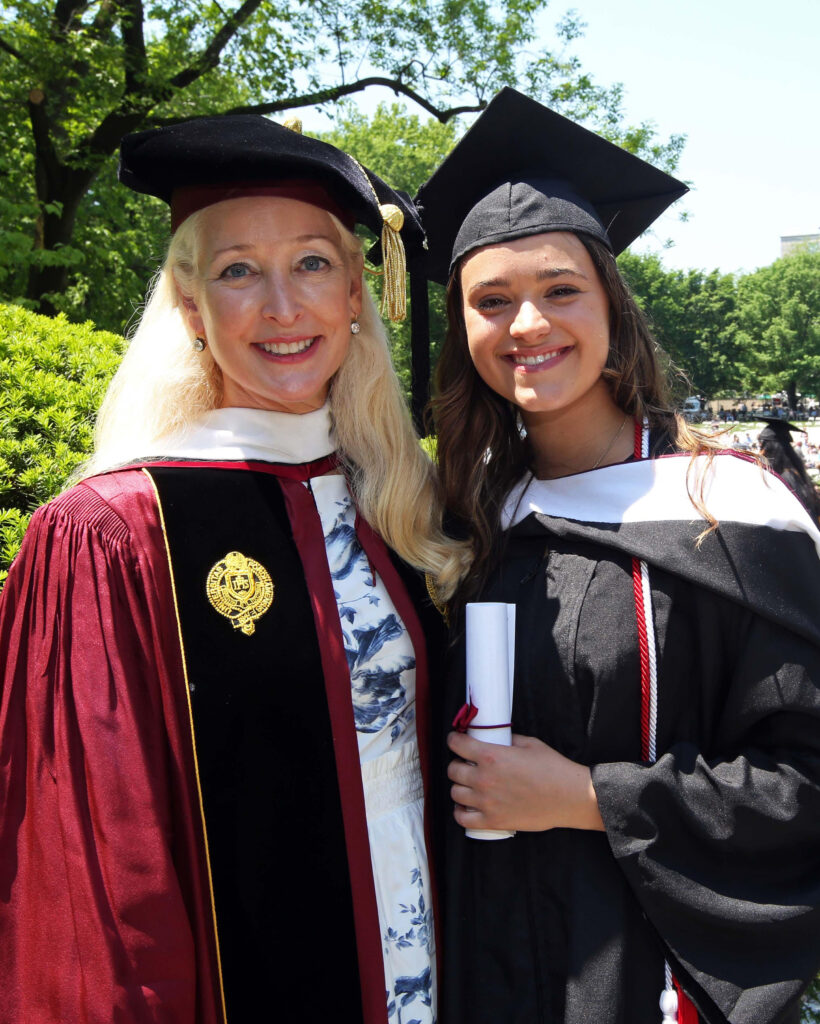
So, I didn’t have a full-time secretary. I didn’t have a dedicated victim witness advocate for the victims and witnesses in my cases. It was just me. When I asked, “Why me?” they said, “Well, you’re the only one who knows how to do everything.” Because as an intern, I had worked the switchboard for the office, I had worked as a victim witness advocate, as an investigator for the various attorneys, and as a secretary. I had helped write briefs. I actually didn’t realize how prepared I was walking into the courthouse. You never know whether the job you’re currently doing is going to be necessary for the job you will be doing. I think that was a good lesson for me.
Also, being in a courthouse and being a prosecutor is a huge responsibility. I think it also taught me to treat people equitably, and with compassion, because you never know what someone’s going through.
Is there a book that had a lasting influence on you?
Yes, it’s a book called There Are No Children Here, and it describes the experience of a family, and particularly focuses on two of the brothers, who grew up in Chicago’s housing projects. It made such an impression on me, reading it when I was in the legal profession. In law school, when I worked for a domestic violence clinical lab, I accompanied women to court and helped them to obtain restraining orders, and domestic violence is a theme in the book. However, the bigger theme is what is happening in society, particularly to children in areas like this housing project, which was notorious for gangs and drugs and violence.
I think the most important part of the book is the idea that children, if given a chance, want to succeed and can succeed. And so for me, that lasting impression is the power of education. Keeping the playing field as level and as open as we can has been critically important to me and to my family. My husband went to Harvard on scholarship, and he says that if somebody did not pay for him to go to school, he wouldn’t be who he is. We’ve endowed scholarships at Harvard and at Fordham, because to us, keeping access is critical. Fordham is one of the most inclusive communities, and we need to ensure that everyone who wants a Fordham education can get one!
What are you optimistic about?
The direction of Fordham! I’ve been involved for 17 years, and over that time I’ve seen Fordham continue to excel and keep the focus on the student and the student experience. Fordham has risen in the rankings while staying true to the mission and cura personalis. So, Fordham’s direction gives me hope based upon everything else that’s going on in the world.
To inquire about giving in support of Fordham athletics or another area of the University, please contact Michael Boyd, senior associate vice president for development and university relations, at 212-636-6525 or [email protected]. Learn more about Cura Personalis | For Every Fordham Student, our campaign to reinvest in every aspect of the Fordham student experience.
]]>
From tennis star Naomi Osaka’s willingness to say “it’s OK to not be OK” to the panic attack-prone title character of the T.V. show Ted Lasso, mental health in sports seems to be having its moment. But the professionalization of wellness in sports is still evolving and involves far more than having a psychologist on staff. It’s about coordinating every aspect of a student-athlete’s well-being, psychologically, physically, emotionally and spiritually, said Djenane Paul.
In September, Paul was promoted to become Fordham’s Deputy Athletic Director for Student-Athlete Welfare and Competitive Excellence. She’s been working since 2016 to bring together the many parts of student-athlete wellness, including nutrition, sports medicine, strength and conditioning, and behavioral health. Her efforts have created an infrastructure on which a full-fledged student-athlete mental health program at Fordham could grow.
Centering Wellness on Cura Personalis
“Part of the goal was to normalize mental health and to build [the program]from a place where student-athlete wellness is rooted in cura personalis,” said Paul. “If we believe that we need to care for the whole unique individual, then we needed it to be consistent with every aspect of a student-athlete’s education, including athletics.”
According to an August 2021 statement on mental health challenges for athletes from the American College of Sports Medicine, approximately 30% of women and 25% of men who are student-athletes report having anxiety, and only 10% of all college athletes with known mental health conditions seek care from a mental health professional. Fortunately, Fordham Athletics had been building its wellness program well before the pandemic exacerbated the issue, said Paul.
Fordham Athletic Director Ed Kull said many aspects of health—including mental health, wellness, and nutrition—are top priorities for Fordham athletics under the University’s $350 million fundraising campaign, Cura Personalis | For Every Fordham Student, which seeks to reinvest in all aspects of the student experience. Other priorities include support for students’ academic efforts and personal, leadership, and career development.
“Our Rams are high-achieving individuals and we are continually identifying new ways to care for their whole person–both in and out of competition,” Kull said.
Paul initially sought guidance from Counseling and Psychological Services Director Jeffrey Ng, Psy. D.; sports performance psychologist Jonathan Fader, Ph.D., and his firm SportStrata; and the students themselves, like Sydney Canessa, GABELLI ’17. Canessa was a senior playing softball when she helped Paul design, distribute, and analyze data from a survey for the then-nascent athlete mental health program.
The anonymous survey asked student-athletes if they or their teammates have ever struggled with mental health, whether they would consider seeing a sports psychologist, and whether they wanted the department to have a therapist on staff. Paul said that she was not surprised to learn that student-athletes were not only open to discussing mental health, but they were also open to seeing a mental health professional. The survey spurred Canessa to work with teammates and Paul to form T.E.A.M. Fordham (Together Everyone Achieves More), which seeks to help student-athletes mentally prepare for their post-athletic careers.
“I personally saw teammates struggle and I thought it would make a huge difference if all athletes could help each other,” said Canessa, adding that her peers didn’t view seeing a therapist as a weakness.
Canessa said that for most student-athletes, graduation often means breaking away from a life-long passion which is the very reason that T.E.A.M Fordham was created—to ensure that student-athletes were prepared for their life after Fordham.
“The majority of us would not become professional athletes once we graduated, so we wanted to make sure that once college was over we didn’t have an identity crisis,” said Canessa.
In 2020, as one athletic season after another was canceled due to the pandemic and discussions around social unrest continued, student-athletes once again pulled together with Paul and Associate Athletic Director for Compliance and Student-Athlete Development Jamilah Ali-Shaffer. With their advisers, along with the Fordham Athletics Social Justice Task Force, they formed a student-athlete-led group called Fordham Connect. Its mission is to create a safe space where student-athletes can engage in open conversations about issues affecting them and foster a healthier environment within Fordham Athletics. While T.E.A.M. Fordham honed its focus on helping student-athletes prepare for a post-academic life and developing the whole person, the Fordham Connect aims to erase the stigma around vulnerability and mental health in sports.
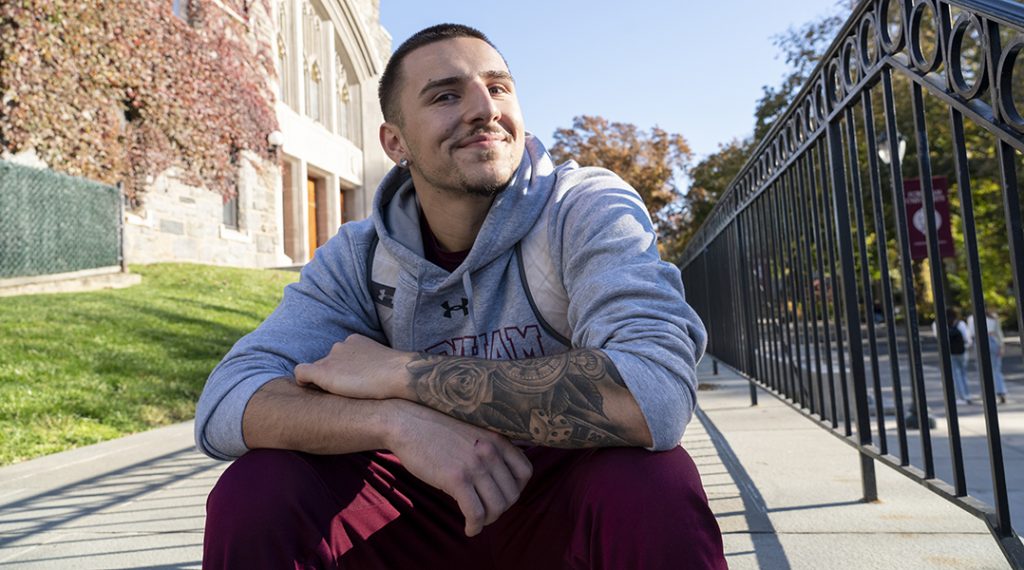
Kickstarting a Wellness Program with NCAA Support
But back in 2017, Paul was still just getting the ball rolling. She took the survey findings to then-Athletic Director David Roach, who backed her plan to further explore formalizing a mental health and wellness program. It’s a position Kull continues to prioritize and support.
At the time Roach was athletic director, the NCAA distributed a one-time grant to assist college athletic departments in promoting health and well-being. The monies were allocated toward mental health and sports psychology, allowing the athletic department to retain SportsStrata as consultants for six years. The funding is now in its fifth year.
Fortuitously, Paul was then approached by Lauren Shute, GSS ’20. Shute, a former student-athlete and sports journalist, was getting her Master of Social Work degree at Fordham. She was interested in the intersection of sports wellness and social work, a field that’s still developing. She asked Paul if she could do her required field placement at Fordham Athletics to help design a program that includes a social worker.
Shute said social workers are trained at helping clients navigate the many existing services already available to them.
“With college athletics, you’re communicating with a lot of systems: a strength and conditioning coach, a dietitian, an academic coach, psychological services, professors,” she said.
She added that coordinating care also must factor in a student-athlete’s background and home life alongside the “macro level factors,” something that social workers are trained to do.
One way to introduce student-athletes to various services, Shute said, is to bring all the players and support staff together to discuss a particular topic, such as body image. Shute and Paul did just that in 2019.
“We facilitated the discussion and teammates did open up,” she said.
It was the first of many discussions organized with coaches, team members, a nurse practitioner from Health Services, the institution’s dietitian, and a psychologist from Counseling and Psychological Services. Other topics included were anxiety, depression, family discord, and transitioning out of sport.
Program Continuity is Key
With every new partnership that Paul fosters, she makes sure that it’s not a one-shot deal. She accepted Shute as an intern provided the GSS partnership continued after she graduated. This year another GSS student was assigned a field placement in Athletics, the second since Shute’s placement. By the end of Shute’s tenure the discussion groups succeeded in getting the word out that a social worker was on hand to help. Coaches and teammates now regularly refer athletes to them.
“My experience was fantastic and what was interesting to me is that a lot of the kids at Fordham are not looking for a career in sports; they’re really there to get an education, they were so trusting and so open and willing to talk about different issues and that’s why the program works so well,” said Shute
In addition to the GSS field placements, Paul helped foster other new partnerships that will continue into the foreseeable future, including partnerships with Boston University, which has sent several sports psychologist interns to Fordham and the consulting partnership with SportStrata has grown to include a contracted mental performance coach who is a licensed mental health counselor.
Coaches at the Center
Paul said aspects of her new role aren’t really all that new. Rather it’s a formalization of support structure that already existed organically.
“We wanted to make sure there was a reporting structure for the coaches and that they were aware of all of the mental health resources available to their student-athletes,” she said. “We then make sure that psychological services, health services, and sports medicine get involved, but the first line of defense will always be the coaches.”
An impromptu interview with a member of the football team on the Rose Hill Gymnasium steps confirmed as much. Fordham College at Rose Hill junior Jeff Ciccio plays tight end on the football team. He said that if he has an issue, he has no problem going to Head Coach Joe Conlin because the coach talks about mental health in team meetings.
“He is very strong with that and likes to talk about it in team meetings and lets us know that he’s always there for us,” said Ciccio. “And another one of my coaches helps me a lot, he likes to check in on me because I’ve gone through some stuff early in my life and he went through something very similar to what I went through.”
Student-athletes usually exhibit the same mental health concerns as the general student population, from relationship concerns to family issues and academic struggles, Melissa Gluck, Ph.D., the therapist dedicated to helping student-athletes from Counseling and Psychological Services.
“The most important thing to remember when serving the athletic community is that these student-athletes are people first and you have to treat the person before the ‘athlete,’” said Gluck. “It’s really easy to think that because they are athletes their problems will be vastly different than other students but that is just not the case.”
However, one key difference is that student-athletes are working two full-time jobs as Fordham students and as athletes, she said. She added that in treatment it’s important to consider team dynamics and what their coaches expect from them.
Fordham coaches believe that having strong mental health is part of the strategy for success, said Paul.
For his part, Ciccio credits Coach Conlin as “the best coach around to keep us mentally strong.”
“We’re only as strong as our weakest link. We got to make sure that everyone is as mentally strong as each other, because not everyone is going to be as physically strong as the next guy in the weight room, so it all comes down to mental. And I think here at Fordham we are very strong mentally.”
To inquire about supporting athletics or another area of the University, please contact Michael Boyd, senior associate vice president for development and university relations, at 212-636-6525 or [email protected]. Learn more about Cura Personalis | For Every Fordham Student, our campaign to reinvest in every aspect of the Fordham student experience.
For more information on giving in support of Fordham athletics, contact Kara Field at [email protected]. Learn more about Cura Personalis | For Every Fordham Student, a $350 million fundraising campaign to reinvest in all aspect of the Fordham experience.
]]>
They’re backed by new energy among fans, a network of enthusiastic student supporters—and a new pool of alumni gifts that athletics director Ed Kull likens to startup funding.
Indeed, the name of the fund—the New Era Fund—reflects the hope that men’s basketball can begin anew after past struggles and that the women’s team can continue its past success.
“Our overall goal right now is to build something from the ground up, something that people are proud of, and want to invest in, because they think it’s special,” Neptune said.
The new fundraising effort is fueled by a belief in the potential of men’s and women’s basketball to advance the University generally—and a hunger for a new winning culture in the men’s program, which has had just two winning seasons since joining the Atlantic 10 in 1995.
For Every Fordham Student-Athlete
As part of its current fundraising campaign, Cura Personalis | For Every Fordham Student, the University is seeking new investments in all sports programs, including men’s and women’s basketball, to enhance the student experience in multiple ways: by supporting student-athletes’ overall development; by stirring new Fordham pride on campus; and by bringing new renown to the University.
Other universities “have really used athletics and maximized them … to elevate the profile of the university,” said Darlene Luccio Jordan, FCRH ’89, a Fordham trustee, co-chair of the campaign, and leader in athletics fundraising. “Strong athletics goes hand in hand with [the]student experience, so it fits perfectly into this campaign and the large themes of the campaign.”
She also noted the potential for athletics to draw interest from donors who start by supporting athletics but go on to invest in other areas, including endowed professorships and financial aid.
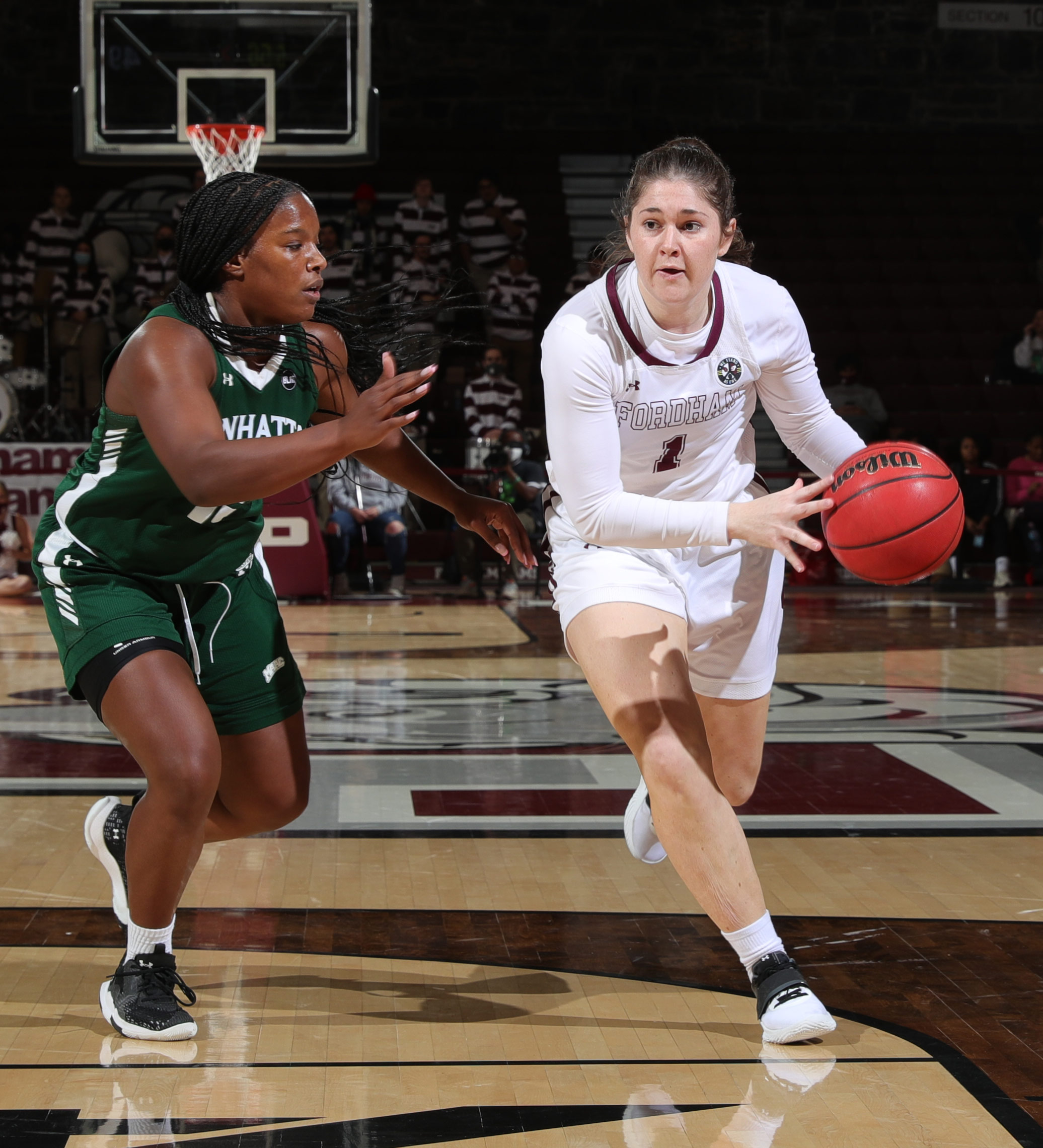
Don Almeida, GABELLI ’73, another University trustee and a Cura Personalis campaign cabinet member, said a strong basketball program can draw in lots of new non-alumni donors who are excited about athletics. It can also signal excellence at the University more generally, and showcase Fordham not only nationally but also globally, in part by leveraging the University’s New York location, he said.
“It’s not [just]about basketball. Basketball is the enabler,” he said. “It’s the method by which Fordham can leverage all its good attributes with a national and international profile and with donors, alumni, students, parents, and others.”
“If you have a national profile, you’re on national TV, you’re in the national press, and everybody gets to know real quickly what Fordham is,” he said.
And new investment in the team is essential, Neptune said. “We’re going against a really, really good league,” in which multiple schools are spending two to four times as much on their teams, he said.
The New Era Fund has drawn more than $3 million in giving to date. It offers support for the men’s and women’s programs in hiring and retaining a talented coaching staff, Kull said, in addition to other things such as marketing, production equipment for recording games, and software to help players analyze the performance of teams they’re about to play against.
It could also fund facilities renovations or charter flights that minimize the disruption of student-athletes’ academic schedules by providing faster, more convenient travel to and from games, he said.
The Herd
Meanwhile, Fordham athletics is also working with a student group dubbed the Herd (formerly Fordham Fanatics) to build new enthusiasm for basketball and all other sports teams at the University.
The basketball season began with a Nov. 4 “Late Night on the Hill” celebration at the historic Rose Hill Gym; rap star A$AP Ferg performed for a crowd of 2,700 students, with student-athletes in attendance. And the Herd’s five student organizers are corralling students via social media and other means to fill the stands for all Fordham sports—from basketball and football to water polo, swimming and diving, softball, and everything in between—and restore the athletics energy that was muted last year because of pandemic lockdowns.
“Already this year there’s been a huge culture change in the fan base,” said one member of the Herd, Dillane Wehbe, a swim team member and a senior at the Gabelli School of Business. “That’s what we’re really going for, just to make the whole experience better—for students to … have fun at the games, for athletes to really feel like they’re being supported by their school.
“It’s a whole new crowd at the games, a whole new energy,” he said.
Another Herd member, women’s basketball team member Kaitlyn Downey, also a senior at Gabelli, is happy to be playing in front of others again after a year of games in “quiet, quiet gym,” with only a recording of applause. “You never really appreciated it, having fans in the stands, until you realize what it’s like when there’s none there,” she said.
Both the women’s and men’s basketball teams are off to encouraging starts, with the men having won seven of their first 12 games and the women surging to 8-3 on a four-game win streak. The Herd members are trying to fill the Rose Hill Gym for home games for both men’s and women’s basketball to fire up the players and fuel their success, said another member of the team, Thomas Aiello, a junior at Fordham College at Rose Hill.
“Just trying to get that feeling back is so imperative to … everything that we’re trying to do,” he said. “When the Rose Hill Gym is full, there’s nothing like it at all.”
To ask about contributing to the New Era Fund, contact Kara Field, director of athletic development and assistant athletic director, at 212-636-8896 or [email protected].
Learn more about Cura Personalis | For Every Fordham Student and make a gift.
If you have a question about giving to Fordham, call 212-636-6550 or send an email to [email protected].
]]>